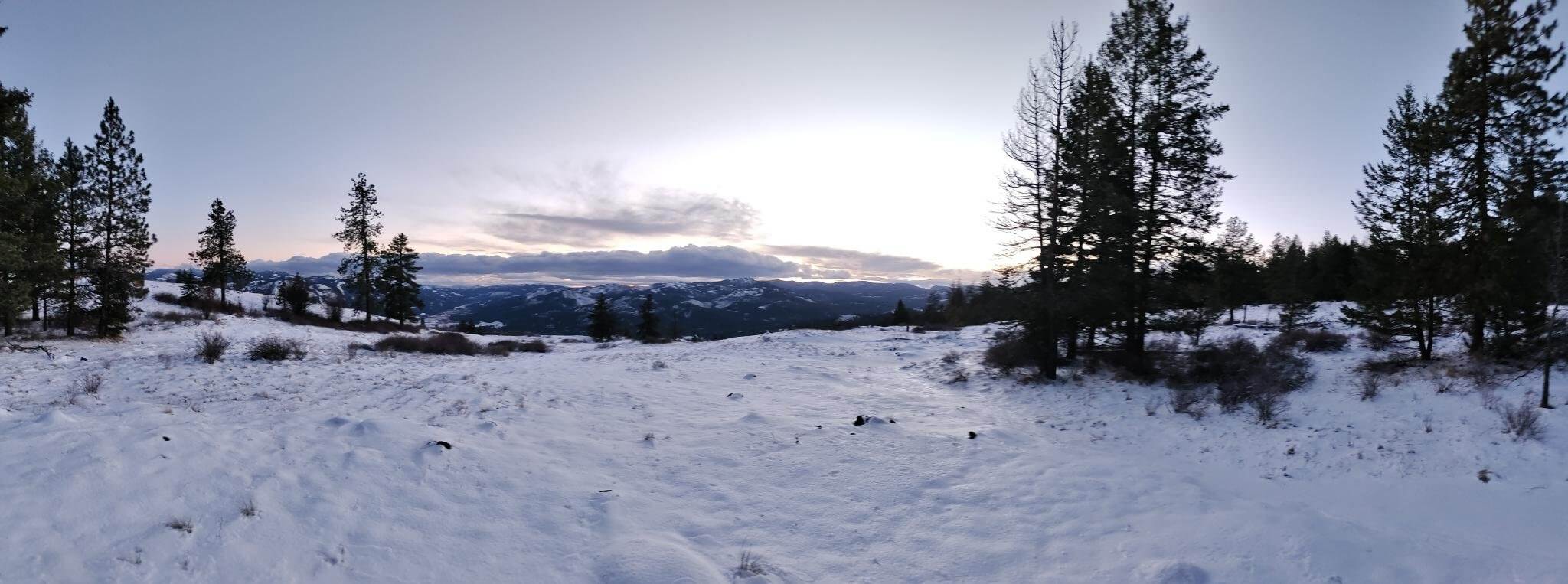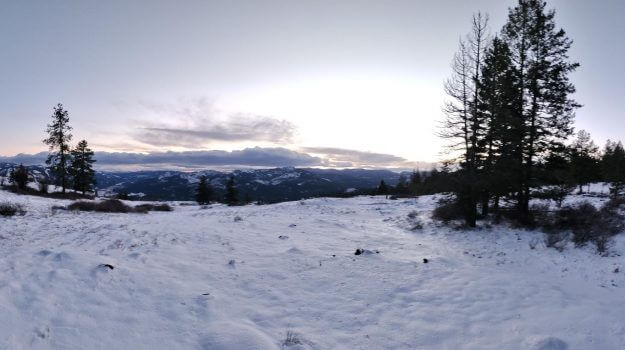We were heading over the highest, most treacherous mountain pass in the state. The road hugged steep hillsides on the right, and—at least in the more hospitable stretches—rode the edge of a sixty-foot ravine on the left. The snow was already thick on the road. It was falling fast enough that even at thirty miles an hour, the headlights cut a tunnel through the gloom that looked, for all the world, like we were in the Millennium Falcon just as it jumped to light speed.
We were hauling a trailer. In the driver’s seat was one of my best friends, who was learning how to drive in the snow. He was doing a yeoman’s job, better than any other beginner I’d taught.. He’d worked past his fear and pulled all the basic lessons down into his muscles. We were nearly home
We rounded a long sweeping turn. He cut it just a hair too sharp.
I felt the wheels start to go. The whole rig started to slide. I felt the trailer break loose with us. Our forty-foot combined length canted groggily sideways to take up the entire width of the forty-five-foot-wide track of the undivided two-lane highway. The road ahead bent to the right. The rig did not. We continued gliding stubbornly to the edge. Someone—probably me—said: “We’re gone.”
And I took a breath.
It’s called a “caesura.” In poetry and rhetoric, it’s a pause for breath that, itself, becomes important to the whole effect of the piece. It is the silent space in which meaning emerges. It’s the quiet before the last rise into the glorious Rhapsody (whether Bohemian or Blue). The deep breath before the plunge.

“Quiet” is not a word our culture associates with excitement. We prefer action, fighting, and struggle (or at least clamor). But it is those moments of quiet in which the meaning of the symphony snaps into focus. The moment at a funeral after the preacher stops yammering. The deep quiet of mid-winter, when the forest snow swallows even the voices of all the critters. Our sensationalist, headline-obsessed culture is focused on reaching the summit, the kill shot, the moment of orgasm—but the meaning does not lie there. It is only in those quiet moments enjoying the view from the top, and the pedestrian down-climb; the relief that the bad guy can’t threaten your children anymore, and the removal of the home invader’s body; the post-coital afterglow and idle chat and the return to the business of the everyday, that great sensation finds its meaning beyond the fleeting moment.
Those great movies of the 70s, the 80s, and the 90s that Millennials and Zoomers are rediscovering? The ones that makes people say “Wow, they just don’t make ‘em like this anymore?”
They work because of the caesura.
Alien is full of such moments. So are the only two Terminator films that worked at all. The moments between the BIG moments. The “boring parts.” Those are the moments where meaning lives.
But the art of meaning requires looking into the abyss, for meaning emerges in those quiet moments after the peaks because the best vantage from which to see that abyss is the peak right on its edge.
The thrill of that peak, the joy of the chase, those moments when we feel so viscerally alive are the ones we chase. It’s how we protect ourselves, that sensationalism. It’s a distraction from that long look down. So we invent more and more ways to weakly mimic that thrill, no matter how shallow and dead that feeling of aliveness they yield, because we will do anything to protect ourselves. We’ll move heaven and earth. We’ll pour billions of dollars into anything or anyone that promises an extra teeny bit of safety, or even the illusion of safety. We’ll lock down an entire world to protect ourselves from the knowledge that frightens us to the core:
When you reach that summit and look down at where you’ve been, and bask in that accomplishment, then you look out at the landscape, the vista you’re taking in is a vista of death. The soil itself is built entirely of the decomposed bodies of dead plants, animals, and the pulverized remains of once-great rocks. It was once traveled by peoples whose names and languages have been forgotten. Their ghost might live on in the gene pool, their art might still whisper among the rocks, but even that will be taken by time in the end.
If you have not held your pet while she died, or slaughtered and butchered your own food, or sat with a parent or a grandparent or friend while their last breath rattled out of their chest, you have not yet practiced the art of death.
If you do not practice the art of death, you can never really live.
Every one of you is a killer. Everything you eat was once alive. Every molecule of your body is plundered from the body or metabolism of another life. It is nature’s job to turn gas into rocks, rocks into life, life into food, and food, again, into rocks and gas. The question that matters is not “Will I die?” or “When will I die?” or even “How will I die?” but “Did my life have meaning?” To pretend otherwise—even to oneself—isn’t just to live a lie, it’s to live a lie that sucks the vitality out of life, robbing it of its only value.
There are consolations, certainly. The fleeting pleasures are pleasant enough, the social climbing games can at least hold your attention, and there may be great appeal in staying comfortably numb…
…but the parts of life that can upset the soul, that can push you into rapture and despair, that allow you to achieve those peaks and sit upon them in the quiet moments where meaning emerges, those are largely out of reach.
When you struggle, you earn those moments of reflection, and they come to you sometimes when you least expect them.
I took that deep breath.
I braced myself for a rollover down a deep ravine. I’d been in a lot of tight spots and car accidents before, and I realized that the chance of walking away from this one was close to zero. I silently thanked my partner for convincing me to buy life insurance just a couple months before.
I relaxed. I didn’t expect to be relaxed at the end. It was nice. I wished I had time to call home and say goodbye, but even if there had been time, there was no signal on that windy little road. I looked into the abyss, and discovered I was…happy.
You see it in great soldiers, great artists, and great thinkers. Aldous Huxley famously went out on an acid trip with a smile on his face, facing the end with a sense of satisfaction. My uncle, who was fortunate enough to have all his marbles and to see the end coming, went out as he lived: telling a bad joke with a sardonic grin on his face. When you live for all its worth, engaging your whole self even when it hurts, when you fight for your own survival and that of your family and friends, when you lay your dreams and hopes and wishes on the line, when you dare to succeed or fail on your own terms, your life becomes precious to you in a way that, paradoxically, makes the thought of losing it somehow less objectionable.
In the passage from which the novel gets its name, Ian Flemming wrote:
You only live twice
Once when you are born
And once when you look death in the face.
In the ten seconds between the break-loose and the terminal end, I had one clear, plain-language thought:
“Huh. I’m okay with this. Guess I did good.”
The rig slid off the pavement, onto the ice on the shoulder, then off the pavement and into the snow.
The snow was a drift. Three feet deep. Just enough to stop us before the edge.
I lazily dropped from of the cab and walked around the truck. The front of the truck was on the ledge. My door was two yards from a cliff. I looked over. The full-moonlight mixed with the headlights to paint the ravine below a pale yellow-blue. A hundred feet below, the icy river splashed audibly over the grumble of the diesel engine.
I stood there a long moment before I walked back to inspect our tracks in the snow to figure out what went wrong, how to we were gonna get back on the road, and to calm down my buddy who was shaking from the adrenaline, and only two thoughts slid through my mind:
“I guess I’ve already done what I needed to to. Everything after today is a bonus.”
Then, I thought of the face I love most in the world, and I thought:
“She doesn’t have to cry today.”
And that made me even happier.
